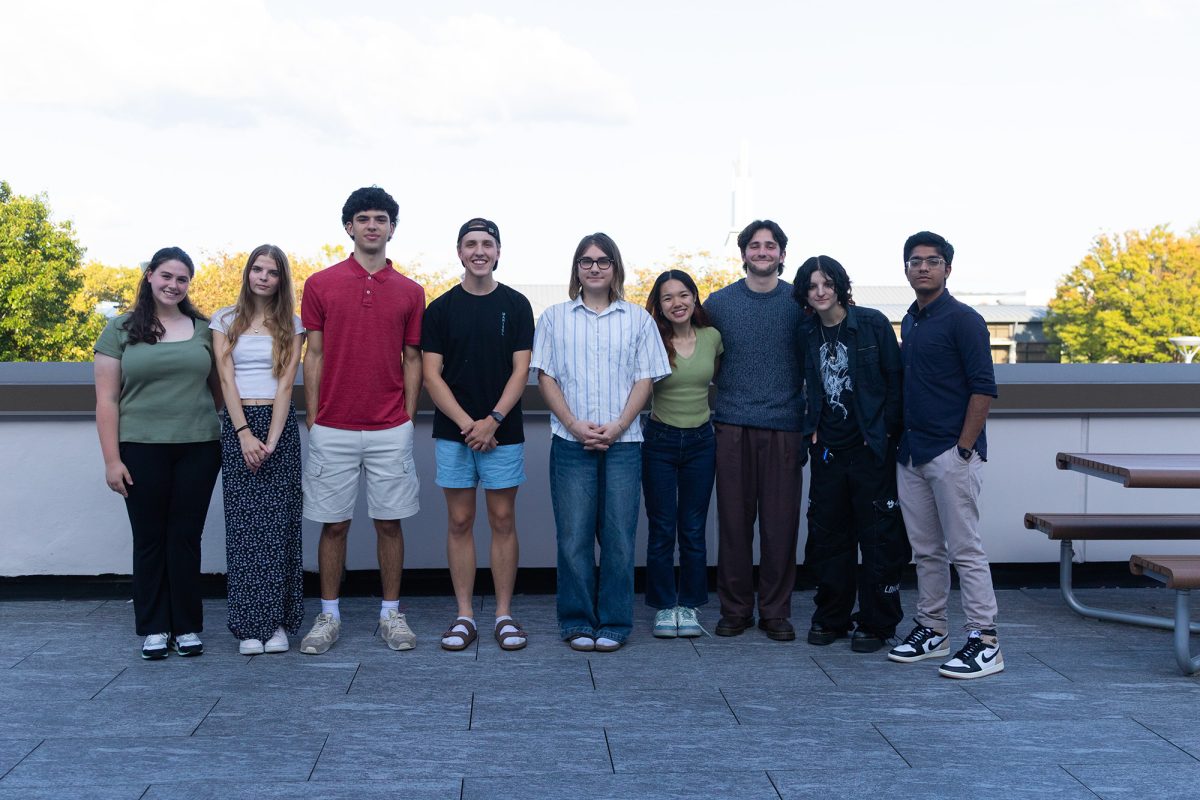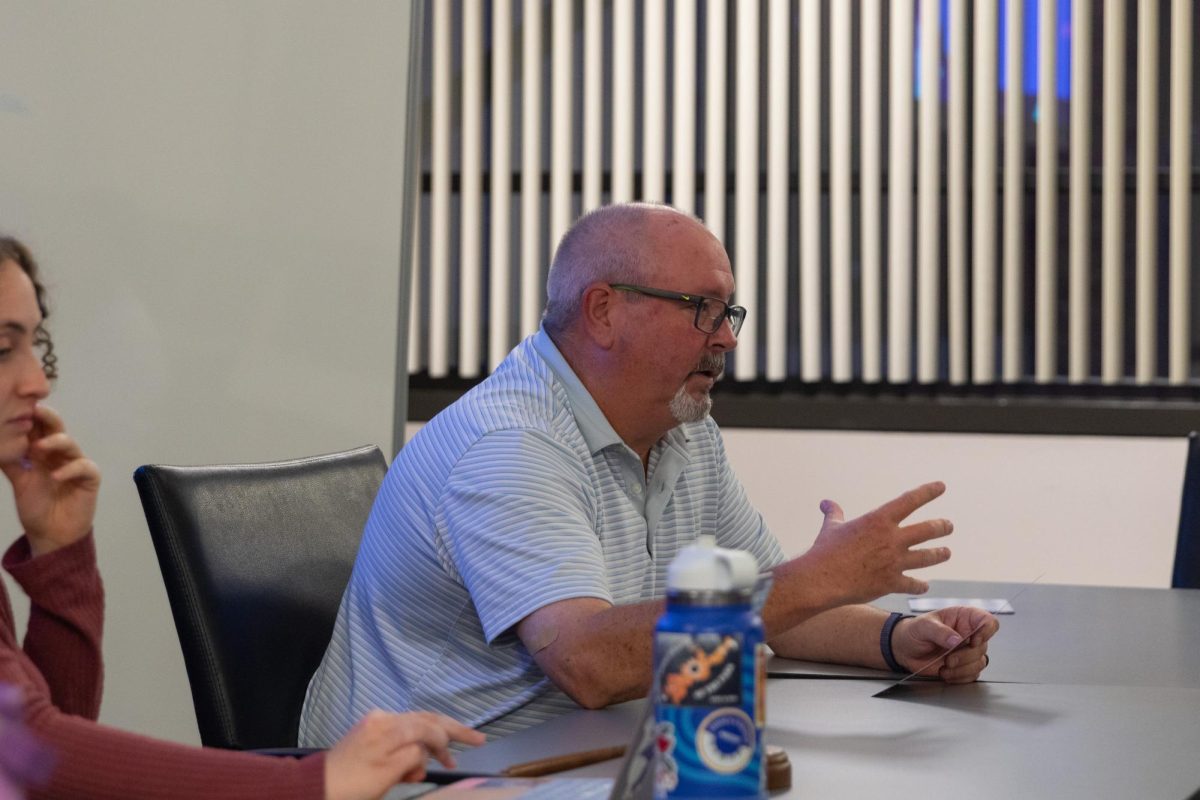Three professors in the School of Business have won the Middle Atlantic Association Colleges of Business Administration’s 2017 Innovation in Teaching Award for their work with the freshman course World of Business.
The three professors who received the award are Alan Cohen, associate professor in the Department of Accounting; Hormoz Movassaghi, professor of finance and international business; and Warren Schlesinger, associate professor in the Department of Accounting. The MAACBA selected Ithaca College’s proposal from 26 other submissions in the undergraduate category of the award, Schlesinger said. This year, the course’s professors have introduced a new business simulation program and discussion of current events into the class.
Schlesinger will attend MAACBA’s annual conference at St. Joseph’s University, held Oct. 11 to Oct. 13, where he will accept the award and give a brief presentation about the changes they implemented in the World of Business course.
A committee of MAACBA board members determined that the college’s submission was the most innovative, Lawrence Singleton, president of MAACBA and dean of Marist School of Management, said.
Singleton said that the Innovation in Teaching award is an important recognition in alternative teaching methods within business schools.
“They have helped their students learn better, they approach the subject matter in a slightly different way,” Singleton said. “So, we think this is a really valuable competition for us, and it’s a big feather in the cap of Ithaca College to have three faculty members in your school who won it this year.”
The World of Business course is required for all freshmen in the business school and has been taught for almost 20 years. The faculty and dean of the business school made significant changes to the course this year, in addition to incremental improvements that have been ongoing since the early 2000s, Movassaghi said. This year, professors of the class will also serve as advisers for the students that they teach, Schlesinger said.
Schlesinger said that diversifying the faculty members who teach the course and requiring that these professors advise freshman students has allowed deeper, more genuine connections to develop between students and these advisers.
“The faculty who teach in the World of Business class now are coming from all different departments,” Schlesinger said. “Each faculty member is the adviser to the first-year students in that class. So, in order for students to be successful, that adviser relationship can really make a difference. We meet with our students three times a week, they get to know us, we get to know them.”
Freshman Anthony Alsante said the course is run differently than the way his classes in high school were. Alsante said Schlesinger encourages students to interact during the class.
Movassaghi was the chair of the original task force that created the World of Business course in 1998. The first changes to the course were implemented when the school was first seeking accreditation from the Association to Advance Collegiate Schools of Business in 2005, Movassaghi said.
The first two additions to the course were the inclusion of hands-on learning and upperclassmen peer mentors, two aspects of the class that are still in place.
Although the course has utilized a simulation in its syllabus for over a decade, this year, the World of Business introduced a new simulation project: MikesBikes. MikesBikes was created for foundation-level business courses by the company Smartsims. Schlesinger said the simulation requires students to work in groups both in and out of class to “run” a small bike manufacturing company, and they must rely on the skills learned in the course to make decisions ranging from pricing to marketing.
“If we’re teaching from an academic perspective about marketing, finance and accounting, we really wanted a simulation that would stretch our students and really bring their academic concepts,” Schlesinger said. “They would apply it in the simulation and compete with each team in the simulation. This is working fantastically well.”
Freshman Zachary Islam, a business student enrolled in the class, said he finds the MikesBikes simulation enjoyable and engaging.
“Even if he’s lecturing about something boring, he does so in such an energetic and lively way that you’re still intrigued,” Islam said. “The MikesBikes game makes it really fun.”
During the summer, prior to the start of the school year, students receive emails giving them the contact information for their MikesBikes group, Schlesinger said. During the World of Business class, students must sit with their group, and are also required to work on homework pertaining to the simulation together.
Schlesinger said this early formation of groups allows students to come to the college as freshmen who have already formed connections with peers and cemented the importance of collaboration.
“We really focus on teamwork because when they get out into the business world, that’s really of critical importance,” Schlesinger said. “Also, we feel that students are more likely to persist at Ithaca College and be successful as freshmen if they develop connections and bonds.”
Another new aspect of the World of Business class is an intentional incorporation of current events. Every Friday, the class discusses current business issues to provide context for their lessons, Movassaghi said.
This addition has been supplemented by each student enrolled in the course being given a digital subscription to Businessweek, made possible by an alumni’s contribution, Schlesinger said.








